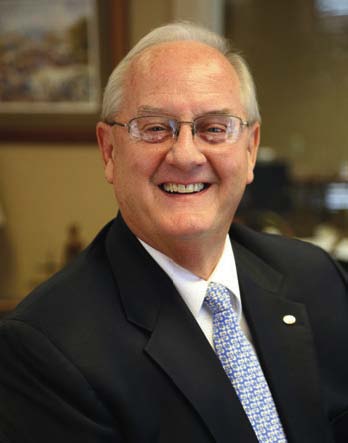Sterling Jones, Vice President of Cotton Services, will retire from Staplcotn on December 31, 2012, after serving the company for more than 30 years. Sterling began his career with Staplcotn as a field representative in the fertilizer and chemical division in 1982. He remarked, “After I graduated from Mississippi State University in ‘71, I went home to cattle farm with my father in Flora, Mississippi.
In 1981, soybean prices went through the roof, similar to what they are doing now. Ultimately, we made the decision to sell our cattle, and I started farming beans for several years. Soon, prices fell and interest rates rose, and I decided to look at other options. I had some friends in Yazoo City who referred me to Staplcotn. When an opening became available in the chemical/fertilizer division, I interviewed and was hired to work out of the Yazoo City office covering a six county area.”
In 1985, it became apparent that Staplcotn’s plans were to transition out of the fertilizer and chemical business and focus strictly on cotton. Sterling’s position with the company also made the transition to that of Cotton Specialist. He remained located in the Yazoo City office until 1991 when his successes placed him in the role of Cotton Services Manager. Once he received that promotion, he and his family moved to the Greenwood area. In 1993, Sterling was promoted to his current position.
When asked about what changes he has seen over the years, Sterling’s answers were quick to surface, “The advances in communications and technologies have really made a huge difference in our abilities to service our membership efficiently. Think about it, back then there were no cell phones or emails. If we needed to go see one of our growers, we had to call and make an appointment. If something happened on the day of the appointment and our grower couldn’t make it, then it was highly probable that the specialist wouldn’t be able to get word until he went to the appointment and discovered that the grower wasn’t there. Cotton Specialists still spend a lot of time going to see their growers in order to take care of their
accounts. But, the process is so much more efficient now. Back then, I had a rule that they had to call into the main office for any update–once in the morning and once in the afternoon. Today, with cell phones and texting and emails, we can get information to and from them exponentially faster!”
Electronic receipts have also impacted the efficiency of the Cotton Services Department. “We used to have to go around and physically pick up all of the receipts from gins, warehouses, stores, growers’ homes, or wherever they would need to meet. Now, it’s just a quick scan. Electronic receipts opened the door to serving regions that we had not been able to serve before, such as areas in the Southeast, due to mere logistics.”
Broadening Staplcotn’s service area to Georgia was another highlight in Sterling’s tenure at Staplcotn. “It was kind of like a shot in the arm. We were familiar with cotton producers in the Mid-South, but we didn’t know what to expect in Georgia. In 1994-95, those areas were going through a boom of cotton farming.
They had been void of cotton for many years because of the boll weevil. Once it was eradicated, they were anxious to farm cotton again. Stan McMikle, one of our Cotton Specialists from the Louisiana area, and I traveled to Georgia many times to sell Staplcotn.
We conducted meetings with cotton producers at locations of proposed gins, warehouses, producers’ shops, restaurants, etc. We had already expanded a little into North Alabama and South Alabama but Georgia was a new and unknown territory for us. It was exciting! Ultimately, I decided that Stan should be transferred from Louisiana to Georgia to service our members there. During the next few years, Georgia increased their cotton production up to approximately one million acres and beyond. Staplcotn has continued to grow as a result of those increased acres.”
Reflecting on his whole “Staplcotn experience,” Sterling commented, “The people that I’ve worked with have been the finest that you would ever meet anywhere. As far as the management team and employees, we all have the same mission and the same goal– and that is to serve our membership. No one’s goal is self-serving, it’s membership- serving, the way it should be. I’ve been blessed to be associated with the entire industry–the members, the directors, the advisory board members, the employees, the gins–everyone. My time here has not just been considered my professional life; it’s been my personal life. I’ve made friends within the industry that I will never forget.”
Meredith Allen, President & CEO of Staplcotn, concurred, “Sterling has enjoyed his job as much as anyone I know. He has really been a strong advocate for the producer in every area. He is not only respected by our staff and our members, he has become close personal friends with many of them. He has truly enjoyed his time in our Field Services Division.”
As for his plans for the future, Sterling and his wife of 42 years, Glenda, have decided to sell their home in Carrollton, Mississippi, and return to their place of origin, within five miles of Flora, Mississippi. “I’ve got three older siblings in that area, and Glenda has one older sibling there, and we both have many friends in that area. We’ll be on a lake where she likes to fish, and I like to drive the boat!” he explained. Sterling also plans to do some hunting and play golf, but most importantly, spend more time visiting his two children and their families. “We have five grandchildren and plan to be seeing them a lot and be more involved in their activities.”


